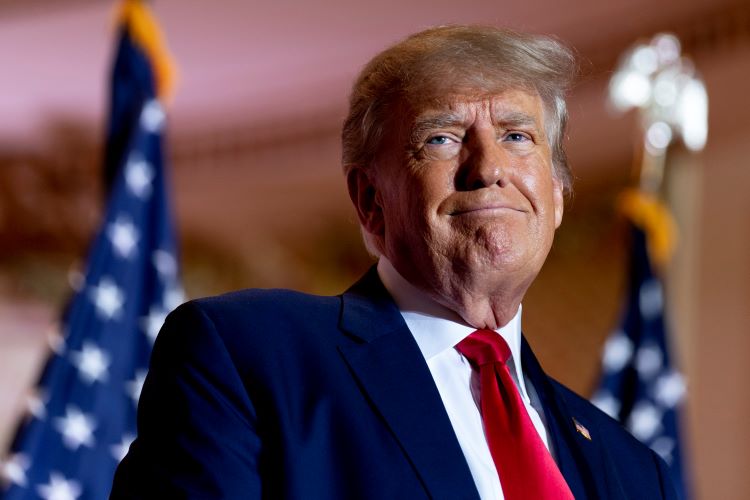Experts see these problems with felony-records case against Trump over hush-money payments

Former President Donald Trump in Palm Beach, Florida, in November 2022. Photo by Andrew Harnik/The Associated Press.
Prosecutors said it was a campaign finance violation. Friends of a prominent politician had made payments to the politician’s pregnant mistress, ostensibly to hide her from voters. But federal jurors were not able to agree on a verdict in the trial of the politician, former U.S. Sen. John Edwards of North Carolina, a former Democratic presidential candidate.
Edwards was acquitted on one campaign finance count in May 2012. Jurors deadlocked on five other counts. He was not retried.
The prosecution of former President Donald Trump could pose even more problems, according to the New York Times and Law360.
Trump was indicted Thursday, reportedly on more than two dozen counts. The indictment likely stems from $130,000 in hush-money payments made to adult film actress Stormy Daniels, who had alleged an affair with Trump. Hush money also was paid to former Playboy model Karen McDougal, who also alleged an affair.
Trump’s former lawyer, Michael Cohen, pleaded guilty in August 2018 to campaign finance violations for making the payments, which were characterized as legal fees. The theory was that the payments were an in-kind campaign contribution to Trump’s campaign that was not reported. Cohen is now likely to be a “star witness” against Trump, according to past coverage by the New York Times.
Trump is likely charged with the state crime of falsification of business records, which is a misdemeanor, unless the false record is made with the intent to cover up another crime.
Experts who spoke with the New York Times and Law360 saw these potential problems with the prosecution.
The need to prove an intent to defraud
To prove a misdemeanor under Article 175 of the New York Penal Law, prosecutors would have to prove that Trump caused others to falsify records “with intent to defraud,” the New York Times previously reported. To prove a felony, prosecutors would also have to show an intent to commit or conceal a second crime. It may be unclear whether Trump’s intent was to avoid personal embarrassment, as his attorney contends, or whether he did it to influence the 2016 presidential election, which could be a campaign finance violation.
“This isn’t a classic example of a campaign expenditure violation, so to say this payment is the basis for a criminal offense is aggressive,” Paul Tuchmann, a partner at Wiggin and Dana and a former federal prosecutor, told Law360. “On the other hand, that is exactly what Cohen pled guilty to, but he didn’t test that theory in court.”
Cohen’s credibility problems
Cohen is now a convicted felon who pleaded guilty to campaign finance violations, as well as bank and tax fraud and lying to Congress. Former Cohen adviser Robert Costello has said Cohen is on a “revenge tour” against Trump.
The statute of limitations
The statute of limitations for most misdemeanors in New York is two years and for a felony-records charge is five years. The Stormy Daniels payment was made in 2016. But New York’s governor extended the statute of limitations by more than a year during the COVID-19 pandemic. And New York law extends the statute of limitations when a defendant is not continuously living in the state.
Using a federal election violation as the second crime
Relying on a federal campaign finance violation as a second crime could lead to a claim that the case doesn’t belong in state court.
“While that second crime could be conspiracy to commit a campaign finance violation, that also presents problems given that campaign finance crimes are federal crimes. So that could trigger a jurisdictional defense,” said Julia Jayne, a white-collar defense lawyer and former California state prosecutor, in an interview with Law360.
Using a state election law violation as the second crime
Trump’s lawyers could argue that a violation of state election law does not apply to the federal presidential campaign.
“Generally, someone can’t be prosecuted for violating a contribution limit in a federal election in a state court,” said Richard L. Hasen, a professor at the University of California at Los Angeles School of law, in an interview with the New York times.
Preemption issues
Federal campaign finance law says it preempts state election law regarding campaign donation limits. That could rule out a prosecution based on state election law 14-126, which makes it illegal to knowingly solicit another person to spend money to avoid campaign contribution limits. Another possibility is state election law 17-152, which makes it illegal to promote the election of a candidate by unlawful means.
There is a better chance that 17-152 won’t trigger federal preemption, according to the New York Times.
See also:
ABAJournal.com: “Selective-prosecution argument in Trump falsified-records case is ‘long shot’ that may still resonate”
ABAJournal.com: “Trump could conceivably run for president and even govern the US from prison, legal scholars say”



